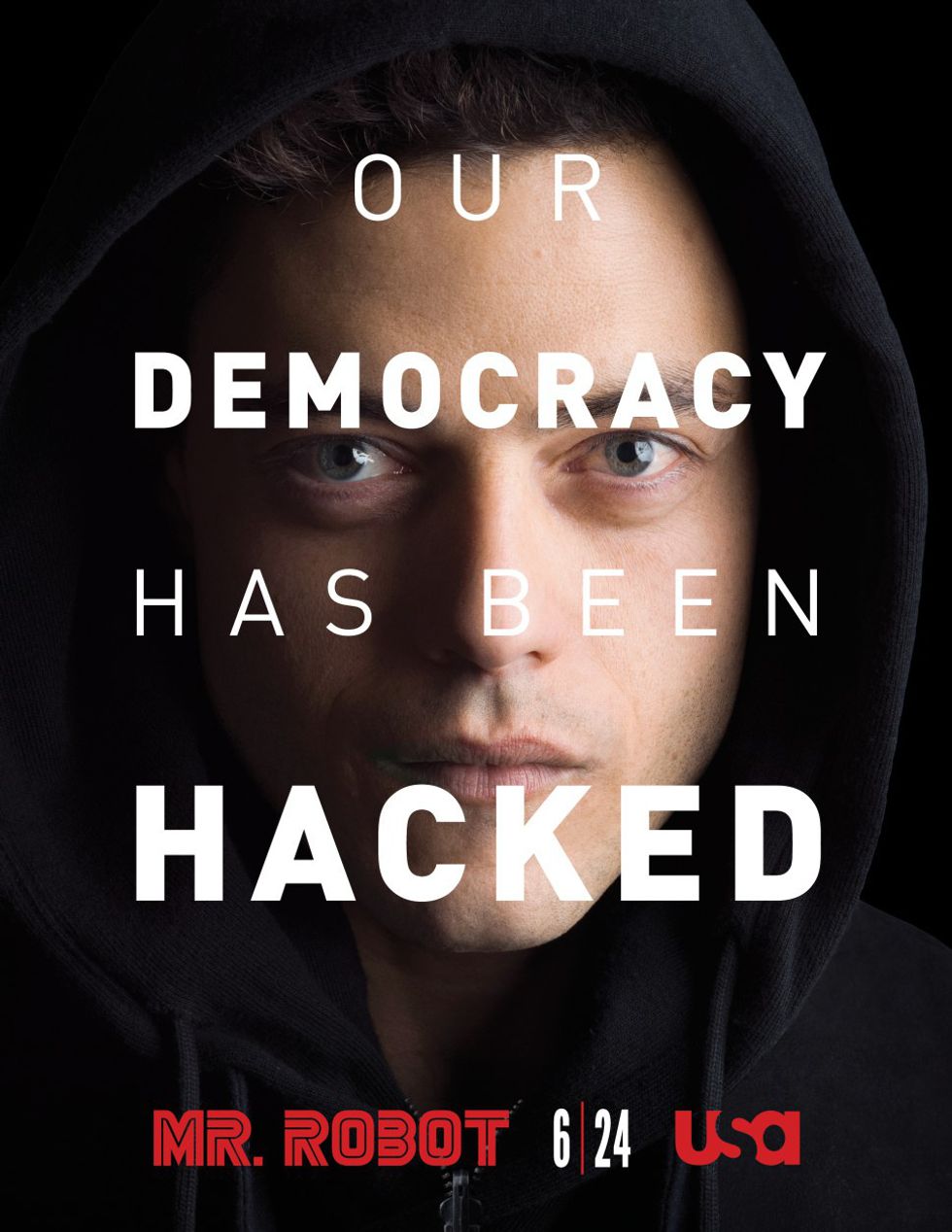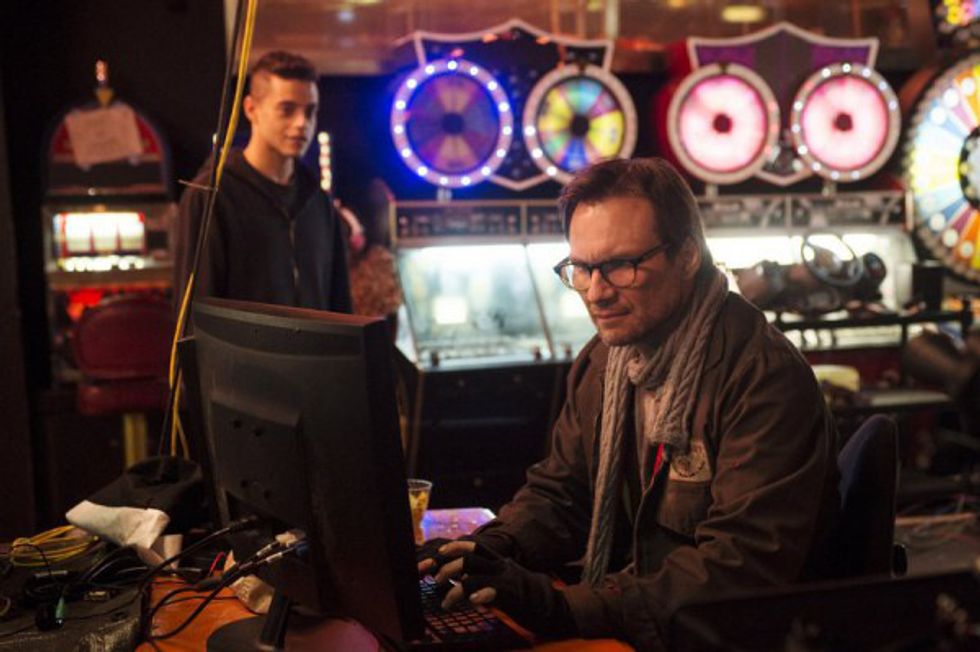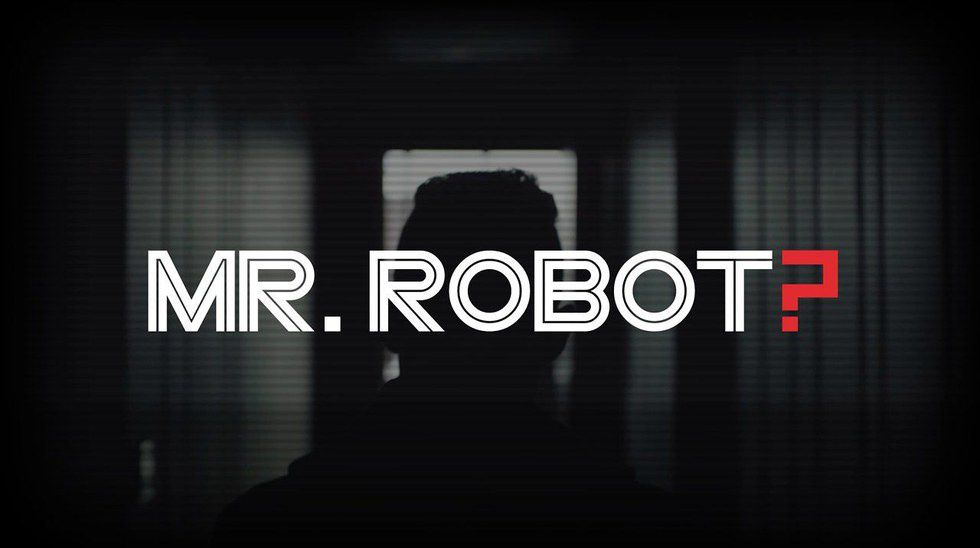"Hello, friend..." are the first words to emerge from the abyss. The introduction is immediately rebuked, "'Hello, friend?' That's lame," by our veiled protagonist. "Maybe I should give you a name." Is he talking to us? Are we actually his friends or simply the makeshift audience he assembled last minute? "But that's a slippery slope. You're only in my head." Are we a part of him? Seeing it all through his eyes? "We have to remember that...I am actually talking to an imaginary person." As if we were his creation, manifested by a worsening psychosis, we find ourselves asking if "we" are even real.
"What I am about to tell you is top secret, a conspiracy bigger than all of us."
Enter Mr. Robot:
Binge watching the debut season of Mr. Robot in a day and reading Fight Club (it was a book first) within the same week blends to make the ideal anarchistic Kool-Aid, with a dash of nihilism, all coated in antiestablishmentarianism. The word "nihilism" alone evokes Vietnam flashbacks of an APLiterature research paper; Hamlet, oh how young, innocent, and so eloquently incomprehensible you could be, especially in high school. But how Edward Norton would monologize in Fight Club (the film), "I am Joe's smoldering" whatever whatever.
The USA Network's track record lists include programs like Burn Notice- which Saturday Night Live accurately describes as "a reality show about sunglasses" - Suits, a serious lawyer drama near replicating Psych without the non-ironic Hawaiian shirts, and, of course, Psych. Slight deviations of cop shows depicting crime, from white collar - incidentally the name of another USA show- or legal perspectives, eventually dilute the factor that sets them apart from the rest. They become run of the mill, and the plot spins through a "case of the week" cycle. Mr. Robot's nature, the plot, the cinematography, the tone and themes, allows it to be so ambitious, so different and heavy, its outlier status refreshes the palate saved for summer television. Sitting down to watch it is akin to the preparation going into viewing a full length feature film, on network television, once a week.
Our protagonist, the medium we see the story through, is Elliot Alderson, an engineer for the cybersecurity firm Allsafe. Suffering from social anxiety, addicted to morphine, Elliot assumes the role of reclusive "vigilante hacker", a trope filled with alternative heroes like The Girl with the Dragon Tattoo's Lisbeth Salander. Elliot dispenses social justice in the only manner he knows how to operate: hacking into the lives of other people. Evident from the opening scene, he takes off his hood, sports a white hat characterizing ethical hacking, and exposes a coffee shop mogul's front for child pornography distribution.
Aside from Elliot's illegal digital crime fighting tactics, he works with his childhood best friend Angela, as she got him the job at Allsafe. The firm's biggest client is the all encompassing E-Corp -think a conglomerate corporation the size of most major banks, credit card, phone, computer, and media companies, combined. Tyrell Werrick, a maliciously ambitious rising executive at E-Corp, oversees the activities provided by Allsafe, searching for any discrepancies. Finally, there is the titular Mr. Robot, the man at the helm of the underground hacker group "fsociety." Mr. Robot recruits Elliot into his organization to accomplish one simple task: burn E-Corp to the ground, hacking it to erase all history of debt, setting the people of the world free. And that is just the first episode!
Rami Malek- the pharaoh from all those Night[s] at the Museum, The Pacific, The Master- sucks us in to this world as Elliot. He projects a dejected atmosphere to his character, isolated from everyone else because of himself, yet draws us in to want more. While speaking to the Grantland Podcast's Andy Greenwald, Malek discussed how Elliot's design was up to him, as he wanted his attire of dark hoodies and boots to resemble "an urban combat uniform." In order to achieve Elliot's sense of anxiousness, Malek even practiced avoiding people on the street, dipping out of making physical contact, method acting that spread into his real life. The show's director of photography, Tod Campbell, told Vulture he worked the show's tone and style around Malek's big eyes- which make him look like an overexcited Pete Davidson - feeling "you can really connect...and get a sense that we are present with him". Watching Malek participate in social situations, like interviews, kneads discomfort, as it is that convincing that Elliot is playing the part of the latest spotlight actor. And not the other way around.
Almost overshadowing Malek's breakout role, cult acting favorite Christian Slater is the enigmatic Mr. Robot. Slater's energy and enthusiastic mannerisms foils to the withdrawn, lethargic personality of Malek's persona. Not surprising that series creator, head writer, and showrunner Sam Esmail envisioned Slater to be a perfect fit for the character. Citing his favor for Slater from Heathers and Pump Up the Volume, Esmail perfectly wrote Mr. Robot to be the actor's typical take on chaos incarnate. Slater dives into signature tirades on what is wrong with the world, specifically the growing wealth gap and humanity's disconnection from when the dot com era was ushered in. Mr. Robot's strength as a character lies in the cause he represents as a personification of his "greater than self" mission; similar to the unrealistic extremism of fantastically ridiculous characters like Batman's Joker and paralleling the "too big to fail" corporate theory supporting the banks Mr. Robot aims to dethrone.
The series' premise of hacking is authenticated by Michael Bazzell, a former FBI cybercrime consultant and the show's technical assistant. Sitting down with International Business Times, Bazzell stated,"...this show has a respect that these things can take time...on a lot of those [movies and TV shows]...they can hack anyone's password in 10 seconds..." Bazzell even revealed to Vulture how involved he was in the scriptwriting and storyboarding process with Esmail:
"I felt this could be the first-ever show that cares about getting hacking right, even if it means altering a story line."
Honeypot networking, malware rootkits, raspberry pi mini-computers, even Linux operating systems for coding and inputting commands, all accurate depictions of hacker culture. Esmail opposed the use of any green screens, leaving the actors to manually type in commands on computer screens. Making it that much more real while satirizing hacker cinema, like Hackers or The Lawnmower Man, for "flying through virtual cityscapes", an fscociety member jokes.
A third article from Vulture has Esmail listing Stanley Kubrick, Taxi Driver, Breaking Bad, and American Psycho, among others, as influences in terms of voice-over narration, camera direction, and fast and forward moving plots, for his own project. Esmail told VICE affiliate Motherboard about all of the real life source material he had at his disposal: notorious hacktivist groups Anonymous, LulzSec, Cult of the Dead Cow. Anonymous member Jeremy Hammond, convicted in 2013 for publishing global intelligence company Stratfor's emails to WikiLeaks, is clearly the anarchastic predecessor and inspiration for Slater's Mr. Robot; Hammond's iconic use of the Guy Fawkes mask, made even more notable from the film/graphic novel V for Vendetta, mirrors Mr. Robot's use of a laughing Monopoly Man like mask in his viral broadcasts. The authenticity of the series is not only in the presentation, but the proper methods as well. Fast Company Magazine praised Mr. Robot for its use of social engineering or "finding a flaw in the system". Trick phone calls, phishing for personal clues necessary in prying into someone's accounts using possible passwords. Strategized calculations used to bypass firewalls are not formed by vigorously typing away at random keys on a laptop.
Elliot, Mr. Robot, and the rest of fsociety, burst through borders of morality to be analyzed as obvious heroes. As Esmail exclaimed to NPR, "...you really can't pinpoint the clear-cut morality here...it's messier 'cause I think it's just more true to life." Theoretically speaking, shutting down the accumulating debt record from banks by erasing any trace of the debt, something even Robin Hood could not do, comes off as noble. Realistically speaking, the downfall of a major corporation like E-Corp brings about global ramifications. Black and white to some may be the colors of noticeable rights and wrongs; most scenes are shot with a gray backdrop. Mr. Robot stands in that gray area- literally, visually speaking- where the right thing to do is ironically the wrong way to do it. Or, the only way to do it.
In stories of human conflict, morality can be played with so even the irregular villain grants introspection into his moral code. Where a likability develops between the audience and this character. A pseudo respect. Normally, representative cases of such conflict are fought using plain, old warfare, which is growing outdated. Now, guns are traded in for laptops, the gatekeeper to the boundless Internet we are yet unable to fully grasp. Through the laptops, comes the distance created from avoiding physical confrontation, everything done in the glow of those screens. Surprisingly, there is no separation between empathizing with Elliot and his cohorts in Mr. Robot. There is in the corporation's case, though. Mr. Robot is about humans fighting corporations, which are only considered people when relating to legal entities. That gray area, where institutions can only be depicted as enemies, shuts down chances of economic bodies from ever being related to.
Hacking is merely the means the characters use to go about setting events in motion. The "down with the system" approach to the subject is a cover. The underlying theme is the interpersonal connections, or lack thereof. The show itself is the entirety of a hack coded by Elliot. The viewer acts as an imaginary listener as Elliot retells the events. The camera is an extension of our onlooking into his world, which means every scene, with or without Elliot, are part of his world. And his hack. Supporting characters, Angela or Tyrell, all call E-Corp by "Evil Corp", a moniker Elliot mentally trained himself to hear whenever he hears, talks about, or thinks of E-Corp. The viewers are in on the hack. And in turn, part of the contradiction, as Elliot is conditioned to feel close to the people- usually criminals- he hacks, repeating the same process to push the people who genuinely care for him away. The distance between people intensifies as the corporations widen the wealth gap leading to the dehumanization of those lower on the social totem pole.
Frustration, anger, any warranted emotional responses, are the tones to the series. After the latest economic crash in 2008, there was an overwhelming hopelessness to the aftermath. Banks were almost busted, but they were saved. Careers ended. Companies imploded. Affiliations toxified, blame placed on supposed people at fault. Mr. Robot preaches anarchistic ethics to Elliot, enraged by the economic meltdown. Mr. Robot is all about the struggle to reclaim that power, shaking off fits of helplessness, stopping the sensation of falling with no monetary support. Breaking the bank through hacking is a wedge in the human condition. Hacking a computer terminal or entire networks gives off the rush of being in control, having the power to crush authority figures without them even knowing. Redistributing the power back to the people reminds them these large corporations should not in control of their lives in their forms. Mr. Robot explores less of the ethics of moral decisions, but more of the logic of why we do things: for the benefit of others, the greater good, or for ourselves, motivated by euphoric superiority.
Large scale cyber attacks, from the Sony hacks potentially facilitated by North Korea to the Ashley Madison account leaks, draw Esmail to assure us "our data can be compromised at any moment" summarized by VICE Media. Internet chitter chatter even had viewers spooked from China's stock taking a dive in August coinciding with the story line of the show, based off the debasement of economic authorities. Our information- social security, account log-ins, credit card numbers- leave us at the mercy of hackers who come to gain so much by selling our identities. Contrarily, according to Mr. Robot's portrayal, the real villains are the corporations themselves, whose long arms stretch, reach, and pin us down; their profit systems are perpetuated by the growing debts that hound us, forcing us to keep one step ahead or lose everything. But all that is within the legal boundaries erected by society, of course. Tally up the score, between the banks and us, taking into account mortgages, student debt, unpaid loans, and they always seem to come out in the lead.
























